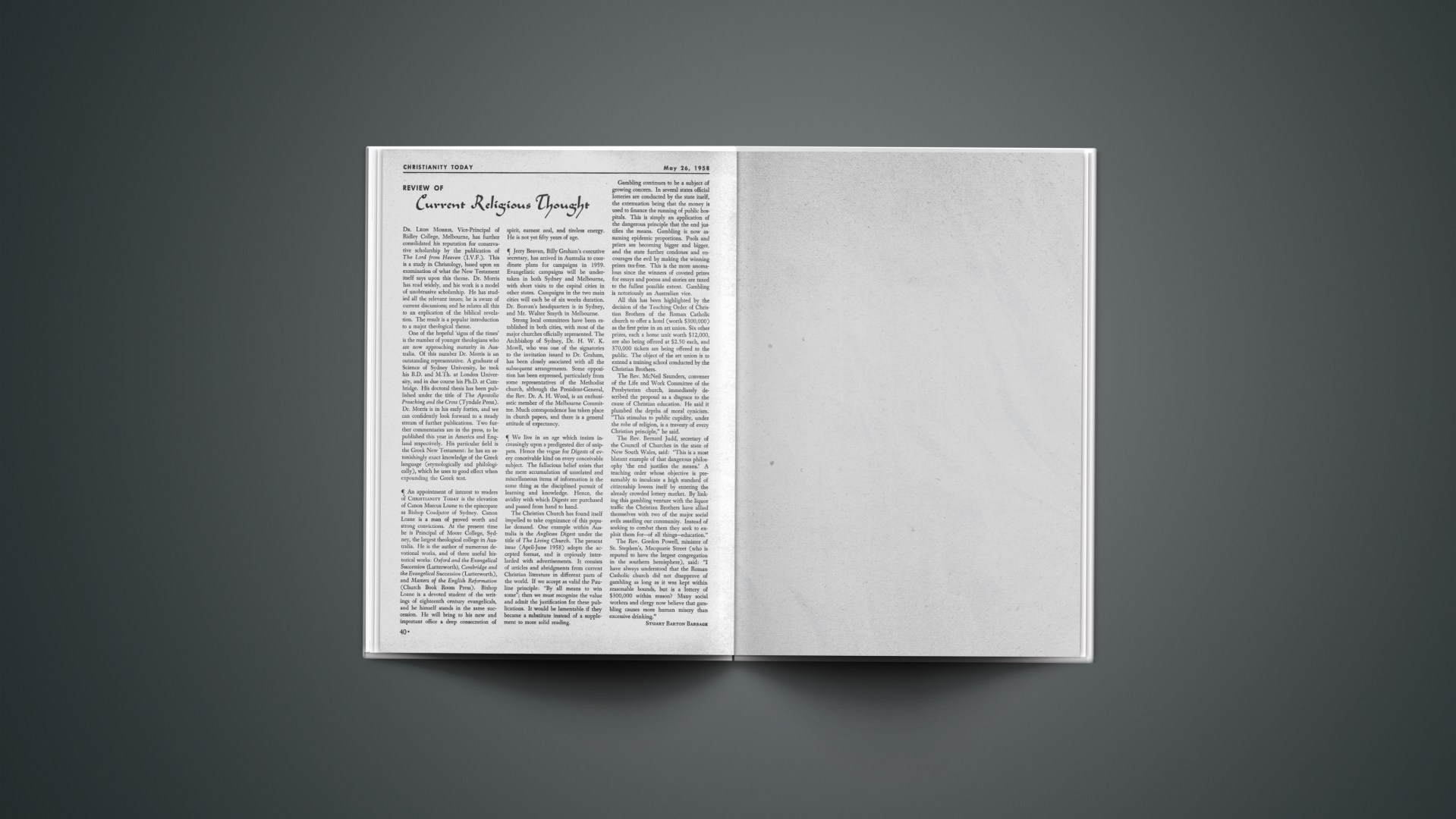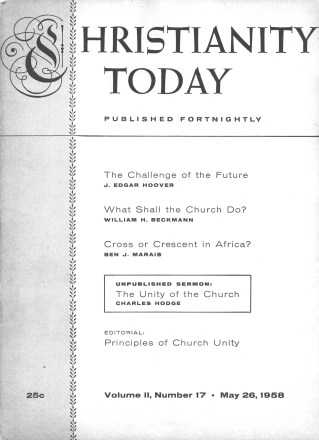Dr. Leon Morris, Vice-Principal of Ridley College, Melbourne, has further consolidated his reputation for conservative scholarship by the publication of The Lord from Heaven (I.V.F.). This is a study in Christology, based upon an examination of what the New Testament itself says upon this theme. Dr. Morris has read widely, and his work is a model of unobtrusive scholarship. He has studied all the relevant issues; he is aware of current discussions; and he relates all this to an explication of the biblical revelation. The result is a popular introduction to a major theological theme.
One of the hopeful ‘signs of the times’ is the number of younger theologians who are now approaching maturity in Australia. Of this number Dr. Morris is an outstanding representative. A graduate of Science of Sydney University, he took his B.D. and M.Th. at London University, and in due course his Ph.D. at Cambridge. His doctoral thesis has been published under the title of The Apostolic Preaching and the Cross (Tyndale Press). Dr. Morris is in his early forties, and we can confidently look forward to a steady stream of further publications. Two further commentaries are in the press, to be published this year in America and England respectively. His particular field is the Greek New Testament: he has an astonishingly exact knowledge of the Greek language (etymologically and philologically), which he uses to good effect when expounding the Greek text.
An appointment of interest to readers of CHRISTIANITY TODAY is the elevation of Canon Marcus Loane to the episcopate as Bishop Coadjutor of Sydney. Canon Loane is a man of proved worth and strong convictions. At the present time he is Principal of Moore College, Sydney, the largest theological college in Australia. He is the author of numerous devotional works, and of three useful historical works: Oxford and the Evangelical Succession (Lutterworth), Cambridge and the Evangelical Succession (Lutterworth), and Masters of the English Reformation (Church Book Room Press). Bishop Loane is a devoted student of the writings of eighteenth century evangelicals, and he himself stands in the same succession. He will bring to his new and important office a deep consecration of spirit, earnest zeal, and tireless energy. He is not yet fifty years of age.
Jerry Beavan, Billy Graham’s executive secretary, has arrived in Australia to coordinate plans for campaigns in 1959. Evangelistic campaigns will be undertaken in both Sydney and Melbourne, with short visits to the capital cities in other states. Campaigns in the two main cities will each be of six weeks duration. Dr. Beavan’s headquarters is in Sydney, and Mr. Walter Smyth in Melbourne.
Strong local committees have been established in both cities, with most of the major churches officially represented. The Archbishop of Sydney, Dr. H. W. K. Mowll, who was one of the signatories to the invitation issued to Dr. Graham, has been closely associated with all the subsequent arrangements. Some opposition has been expressed, particularly from some representatives of the Methodist church, although the President-General, the Rev. Dr. A. H. Wood, is an enthusiastic member of the Melbourne Committee. Much correspondence has taken place in church papers, and there is a general attitude of expectancy.
We live in an age which insists increasingly upon a predigested diet of snippets. Hence the vogue for Digests of every conceivable kind on every conceivable subject. The fallacious belief exists that the mere accumulation of unrelated and miscellaneous items of information is the same thing as the disciplined pursuit of learning and knowledge. Hence, the avidity with which Digests are purchased and passed from hand to hand.
The Christian Church has found itself impelled to take cognizance of this popular demand. One example within Australia is the Anglican Digest under the title of The Living Church. The present issue (April–June 1958) adopts the accepted format, and is copiously interlarded with advertisements. It consists of articles and abridgments from current Christian literature in different parts of the world. If we accept as valid the Pauline principle: “By all means to win some”; then we must recognize the value and admit the justification for these publications. It would be lamentable if they became a substitute instead of a supplement to more solid reading.
Gambling continues to be a subject of growing concern. In several states official lotteries are conducted by the state itself, the extenuation being that the money is used to finance the running of public hospitals. This is simply an application of the dangerous principle that the end justifies the means. Gambling is now assuming epidemic proportions. Pools and prizes are becoming bigger and bigger, and the state further condones and encourages the evil by making the winning prizes tax-free. This is the more anomalous since the winners of coveted prizes for essays and poems and stories are taxed to the fullest possible extent. Gambling is notoriously an Australian vice.
All this has been highlighted by the decision of the Teaching Order of Christian Brothers of the Roman Catholic church to offer a hotel (worth $300,000) as the first prize in an art union. Six other prizes, each a home unit worth $12,000, are also being offered at $2.50 each, and 370,000 tickets are being offered to the public. The object of the art union is to extend a training school conducted by the Christian Brothers.
The Rev. McNeil Saunders, convener of the Life and Work Committee of the Presbyterian church, immediately described the proposal as a disgrace to the cause of Christian education. He said it plumbed the depths of moral cynicism. “This stimulus to public cupidity, under the robe of religion, is a travesty of every Christian principle,” he said.
The Rev. Bernard Judd, secretary of the Council of Churches in the state of New South Wales, said: “This is a most blatant example of that dangerous philosophy ‘the end justifies the means.’ A teaching order whose objective is presumably to inculcate a high standard of citizenship lowers itself by entering the already crowded lottery market. By linking this gambling venture with the liquor traffic the Christian Brothers have allied themselves with two of the major social evils assailing our community. Instead of seeking to combat them they seek to exploit them for—of all things—education.”
The Rev. Gordon Powell, minister of St. Stephen’s, Macquarie Street (who is reputed to have the largest congregation in the southern hemisphere), said: “I have always understood that the Roman Catholic church did not disapprove of gambling as long as it was kept within reasonable bounds, but is a lottery of $300,000 within reason? Many social workers and clergy now believe that gambling causes more human misery than excessive drinking.”










